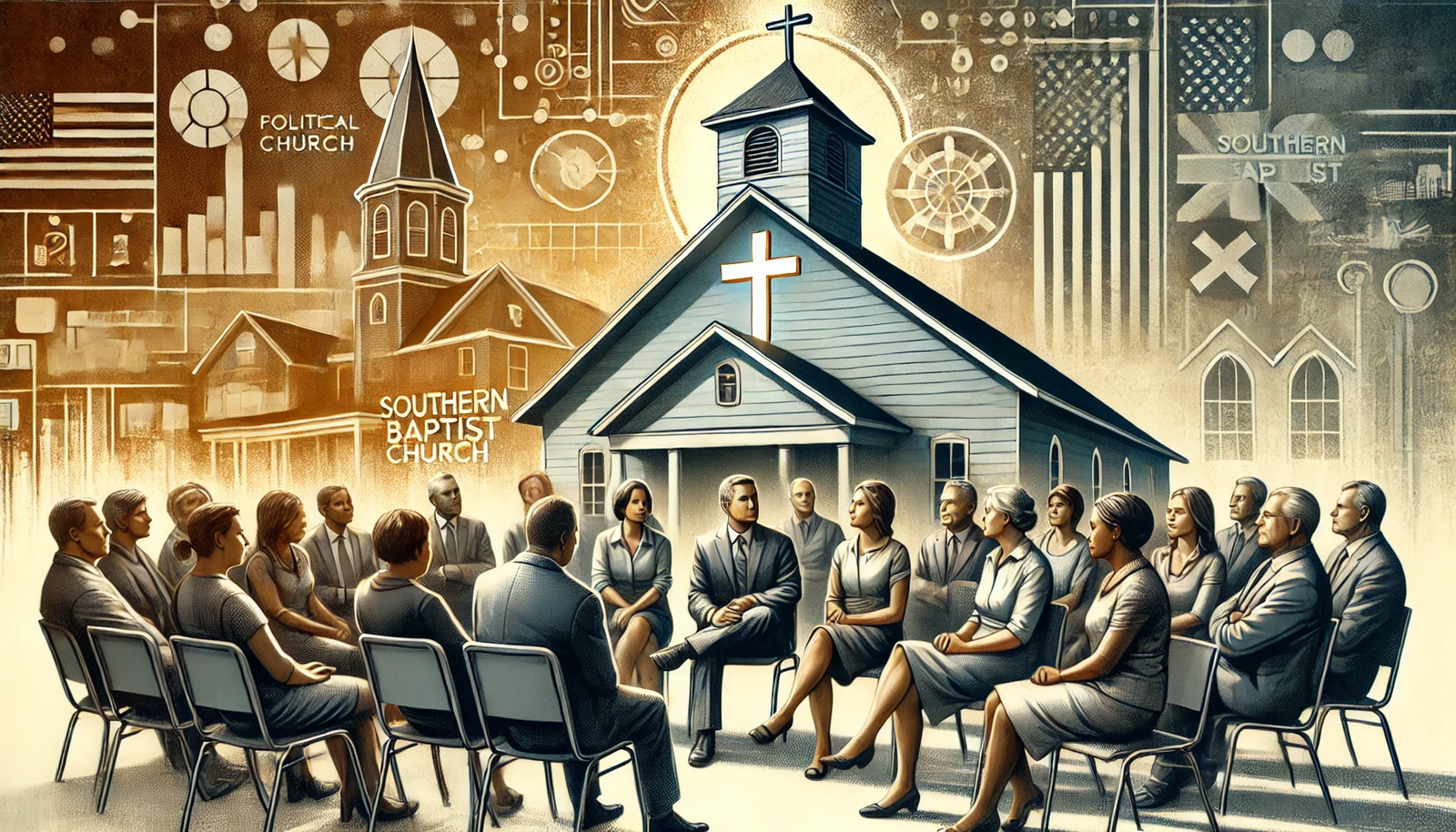|
Edward Harrington Heyburn Audio
Getting your Trinity Audio player ready...
|
The Southern Baptist Convention (SBC), the largest Protestant denomination in the United States, has not always been the staunch opponent of abortion that it is today. Over the past 50 years, the SBC’s stance has shifted from a moderate, pragmatic view to an uncompromising pro-life position. While theological considerations played a central role in this evolution, non-religious factors—such as political realignment, cultural backlash, and economic anxieties—also significantly influenced the denomination’s changing perspective. This article explores the factors that shaped the SBC’s position on abortion, tracing the interplay between its theological convictions and broader socio-political forces.
The Early Position: A Moderate Stance on Abortion
In the early 1970s, the SBC held a relatively moderate view on abortion. At its 1971 annual meeting—two years before the Supreme Court’s Roe v. Wade decision—the Convention adopted a resolution that called for the legalization of abortion under circumstances such as rape, incest, severe fetal deformity, and threats to the mother’s physical or emotional health. This resolution was indicative of a pragmatic approach, reflecting the view that abortion was a complex moral issue best addressed on a case-by-case basis.
Theological Context of the Early Position
At the time, Southern Baptists emphasized individual moral responsibility and tended to view abortion as a personal decision rather than a public moral crisis. The theological debate over when life begins was not as sharply defined as it would later become. Early Southern Baptist leaders often interpreted scripture as allowing for flexibility in matters of conscience, particularly in situations involving human suffering or complex ethical dilemmas.
The Shift Begins: Roe v. Wade and the Conservative Resurgence
The Supreme Court’s 1973 decision in Roe v. Wade, which established a constitutional right to abortion, was a turning point for the SBC, though its response was initially muted. The denomination’s more pronounced shift toward a pro-life stance began in the late 1970s, driven by two key developments: the theological realignment known as the Conservative Resurgence and the emergence of the Religious Right as a political force.
Religious Factors in the Shift
1. The Conservative Resurgence: By the late 1970s, the SBC was undergoing a significant internal struggle over biblical inerrancy—the belief that the Bible is without error in all it teaches. This movement, which ultimately reshaped the denomination’s leadership and theological priorities, placed greater emphasis on a literal interpretation of scripture. Verses such as Psalm 139:13–16, which describes God’s involvement in forming life in the womb, were increasingly interpreted as evidence that life begins at conception.
2. Sanctity of Life Doctrine: As the Conservative Resurgence gained momentum, the sanctity of human life became a central theological principle. Southern Baptist leaders began to equate abortion with the taking of innocent life, framing the issue as a fundamental moral and spiritual concern.
3. Alignment with Evangelical Theology: The SBC’s theological evolution mirrored broader trends within evangelical Christianity, which increasingly emphasized pro-life activism as a core moral responsibility.
Non-Religious Factors Influencing the Shift
While theological arguments were central to the SBC’s changing stance, non-religious factors also played a significant role in reshaping the denomination’s position on abortion.
1. Political Realignment
The political realignment of the South in the late 20th century was a critical factor in the SBC’s shift on abortion. Historically, Southern Baptists had been aligned with the Democratic Party. However, beginning in the 1960s and 1970s, issues such as civil rights, states’ rights, and moral conservatism began pushing Southern voters toward the Republican Party. As the GOP increasingly adopted a pro-life platform, Southern Baptists became more politically aligned with the party’s stance on abortion. By the 1980s, abortion had become a litmus test for Republican candidates, further solidifying the SBC’s pro-life advocacy.
2. The Rise of the Religious Right
The Religious Right, a political movement that mobilized conservative Christians around moral issues like abortion, played a key role in galvanizing Southern Baptists. Leaders such as Jerry Falwell and Paul Weyrich used abortion as a rallying point to unite evangelicals in opposition to what they saw as a moral decline in American society. The SBC, as the largest evangelical denomination, became a crucial constituency within this political coalition. This alignment was not just theological but also strategic, as the Religious Right sought to influence public policy and judicial appointments.
3. Reaction to the Feminist Movement
Second-wave feminism, which emphasized reproductive rights as central to women’s equality, also influenced the SBC’s stance. For many Southern Baptists, the feminist movement represented a challenge to traditional gender roles and family structures. Abortion, as a cornerstone of feminist advocacy, became a focal point for conservative resistance. By opposing abortion, the SBC positioned itself as a defender of traditional values, including motherhood and the sanctity of the family.
4. Cultural Anxiety and Moral Decline
The late 20th century was marked by significant cultural changes, including the sexual revolution, rising divorce rates, and increasing secularization. Many Southern Baptists saw these trends as evidence of a broader moral decline. Abortion became a symbol of this perceived crisis, representing what they saw as a devaluation of life and family. By opposing abortion, the SBC sought to push back against what it perceived as a culture of permissiveness and moral relativism.
5. Economic and Demographic Concerns
Economic factors also played a role in the SBC’s evolving position. During the 1970s and 1980s, economic stagnation and concerns about the future of the traditional family fueled anxiety among Southern Baptists. Abortion was often framed as a symptom of a society prioritizing individual convenience over responsibility and family stability. Additionally, conservative rhetoric linked abortion to welfare policies, framing it as part of a broader “culture of dependency” that undermined traditional values.
The Modern Position: Uncompromising Pro-Life Advocacy
By the 1980s, the SBC had adopted a staunchly pro-life position, opposing abortion in virtually all circumstances. This transformation was formalized in resolutions at the denomination’s annual meetings and through its active participation in pro-life advocacy efforts.
Key Features of the Modern Position
1. Total Opposition to Abortion: The SBC now opposes abortion in nearly all cases, including those involving rape or incest, emphasizing adoption and other alternatives instead.
2. Public Advocacy: The denomination works closely with pro-life organizations and actively lobbies for anti-abortion legislation.
3. Celebration of Legal Victories: The SBC has celebrated legal victories such as the overturning of Roe v. Wade in 2022 (Dobbs v. Jackson Women’s Health Organization), viewing these developments as affirmations of its moral and theological commitments.
Conclusion: A Convergence of Faith and Politics
The Southern Baptist Convention’s shift on abortion reflects a complex interplay of religious and non-religious factors. While the Conservative Resurgence and sanctity of life doctrine provided a theological foundation for its pro-life stance, broader socio-political dynamics—such as the rise of the Religious Right, cultural backlash against feminism, and the political realignment of the South—were equally influential. Today, the SBC’s uncompromising opposition to abortion is a defining feature of its identity, shaped as much by its theological convictions as by its engagement with the cultural and political forces of modern America.
Understanding this evolution provides insight into how religious and secular forces can intersect to shape the moral and political priorities of a major faith tradition.


